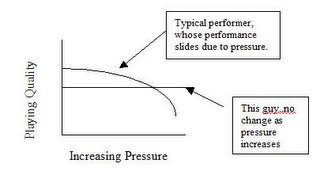Congratulations, everyone!
I've also been spending a lot of time going over the ensemble placement audition recordings. Here at USC, auditions are recorded and I receive a CD to review. I go through the whole CD once and then, with the luxury of each selection having its own track, I started at the highest scored lyrical selection (or technical, or sight-reading) and then jump around hearing them not in audition order but in the order I initially scored them.
In other words, I start with the track I scored highest and work my way down. This allows me to hear to selections side by side and make sure the scores are consistent. True, this is time-consuming but I know my students have a lot at stake and I want to make sure I get it right.
All this reminds me of experiences I had auditioning when I was a student. There was one guy in the studio who, as far as we could tell, was mildly autistic (or at least had some kind of developmental disorder). He wasn't the best player in the studio, but when auditions came around, he didn't became even slightly nervous. Thus, he played pretty much exactly the same way whether in the practice room or in the audition.
Other players would have to deal with nerves and sometimes end up not playing us well under pressure as they had practiced.
I think it drove some people nuts to be "stronger" players but unable to prove it in auditions while this guy simply continued on his even keel.
Here's this idea in graph form:

Of course, I have included a third curve which goes up as pressure increases. This kind of player is sometime referred to as a "money player."
Another way to think of it..
There are two skills in music:
- Instrumental skill
- Performing skill
The conclusion: you need to have both skills in order to succeed.